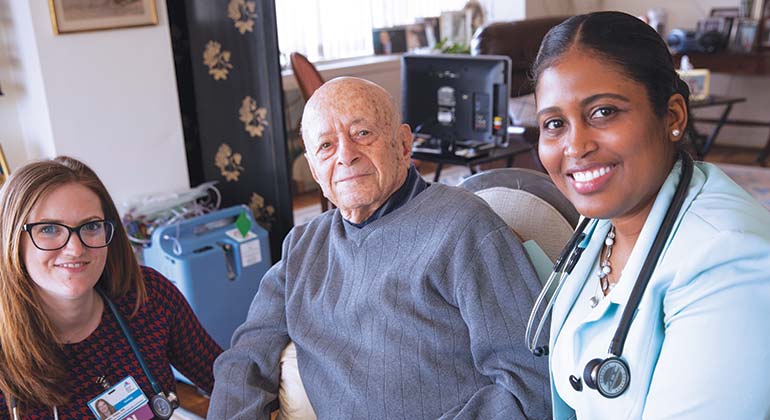Mount Sinai at Home

The Mount Sinai at Home program is an innovative health care delivery model. We provide medical care in patients’ homes who might otherwise need to be in the hospital or rehabilitation facility. A team of doctors, nurse practitioners, registered nurses, and other professionals treat and monitor your health during and following an illness or injury. We also provide primary and palliative care for complex patients who have difficulty accessing medical care, and provide home health care for eligible patients who need support between medical visits.
Mount Sinai at Home exemplifies our commitment to providing cutting-edge medicine and creating an innovative health care system that is changing the lives of our patients. The program also illustrates Mount Sinai’s status as a pioneer in the development of new clinical and financial models for patients with acute, sub-acute and chronic complex illnesses.
Advantages of Mount Sinai at Home include:
- Comfort and convenience of high quality care in the home setting
- Communication with doctors, nurse practitioners, and nurses face-to-face or via video without ever leaving the home
- A single point of contact available to answer questions and manage care-team communications
- Regular home visits from registered nurses, physical or occupational therapists, and other specialists
Programs
Today, we offer the following Mount Sinai at Home programs:
- Home Health Care
- Hospitalization at Home (HaH)
- Palliative Care at Home (PCaH)
- Rehabilitation at Home (RaH)
- Remote Patient Monitoring at Mount Sinai
Hospitalization at Home
Our Hospitalization at Home program provides hospital level care in the comfort of your home. You may receive in-home and video visits from nurse practitioners, doctors and nurses to provide clinical treatments and to coordinate care as needed. Our program delivers and provides IV medications, lab tests, and equipment to facilitate your recovery in the comfort of your home.
Palliative Care at Home
Palliative Care at Home provides specialized in-home care focused on improving quality of life with support available 24-hours a day. Palliative care is a team-based medical specialty which provides an added layer of support to seriously ill patients, their families, and their healthcare providers. Our program provides in home and virtual visits with your care team, symptom management, physical, psychosocial, spiritual, emotional and social service support.
Rehabilitation at Home (RaH)
Rehabilitation at Home (RaH) is designed to provide care following hospitalization for rehabilitation, medical, and nursing services instead of a nursing home stay for qualifying patients. You will receive physician oversight and home visits from nurses who can be scheduled for medically required treatments including IV medications. Rehabilitative services include physical therapy, occupational therapy, and speech therapy and any necessary care coordination to keep you safe and recovering in your own home.
Home Health Care
Home Health Care provides a dedicated team of professionals equipped to deliver specialized care at home utilizing the latest technology and nurses or therapists to conduct over-the-phone consultations and home visits. Nurses are available after hours, and on weekends and holidays for emergencies.
Remote Patient Monitoring at Mount Sinai
Managing chronic conditions from home
Mount Sinai’s Condition Management Program offers a Remote Patient Monitoring (RPM) service that uses in-home devices to monitor patient’s vital signs remotely. For example, a patient living with hypertension would receive a blood pressure monitor that send readings taken in the patient’s home directly to the patient’s electronic medical chart for evaluation by their physician and our team of clinical pharmacists.
Program Benefits
A number of studies have shown that Mount Sinai at Home, and the legacy hospital at home models which it was modeled after, is an effective alternative to traditional hospital care for certain conditions.
The program delivers improvements in three key measures:
- Improved outcomes: A critical benefit of the program is comparable or improved patient outcomes across key measures—particularly 30-day emergency room revisits and 30-day hospital readmission rates.
- Increased patient satisfaction: Enrollment in this program leads to improved patient satisfaction—patients simply prefer to be treated in the comfort of their homes.
- Lower cost of care: Another significant benefit of the program is lowering the cost of patient care—both directly and indirectly in terms of cost of stay and length of stay.